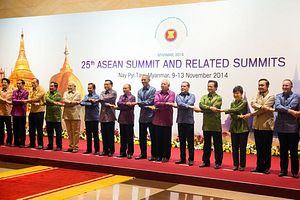Chinese Premier Li Keqiang is in Myanmar this week for the China-ASEAN Summit, the East Asia Summit, and the ASEAN Plus Three (China, Japan, and Korea) meetings. While in Naypyitaw, Li pledged $20 billion in loans to Southeast Asia for regional infrastructure development. That’s in addition to $3 billion for the China-ASEAN Investment Cooperation Fund, which funds infrastructure and energy investments in ASEAN member countries, and $480 million to help fight poverty in Southeast Asia. China also promised preferential treatment to ASEAN investors under an expanded China-ASEAN free trade agreement.
The financial push is part of a plan to reassure ASEAN member states that China’s rise is beneficial for its neighbors and for the region as a whole. Several ASEAN members, most notably Vietnam and the Philippines, have long-standing territorial disputes with China, and Beijing’s recent emphasis on maritime prowess has led to more clashes in the region.
When it comes to maritime issues, China is attempting to deflect the focus from territorial disputes to areas with potential for cooperation. Beijing and ASEAN have declared 2015 “the ASEAN-China Year of Maritime Cooperation,” Xinhua reports, with China providing funding for maritime infrastructure, scientific research, and search and rescue capabilities. China is eager to prove to Southeast Asian counties that its growing maritime prowess can be beneficial to the region. When Chinese Foreign Minister Wang Yi visited Indonesia earlier this month, he emphasized that China’s maritime initiatives (most notably the Maritime Silk Road) are compatible with Jakarta’s own maritime ambitions. This message applies to all of ASEAN, as the recent meetings made clear.
To the extent that China’s emphasis on maritime cooperation extends to the territorial disputes, it will mean more communication between maritime law enforcement agencies as well as setting up a hotline between foreign ministers for use in case of maritime emergencies. A statement issued after the China-ASEAN summit voiced support for these measures, as well as for a tabletop exercise on search and rescue.
Obviously, however, the area of greatest concern for many of China’s neighbors remains the most resistant to any maritime cooperation initiatives. The South China Sea disputes are one of the major obstacles to overall China-ASEAN relations, not to mention China-ASEAN maritime relations. There was little progress to show on this front, other than references to implementing “early harvest measures” relating to a China-ASEAN code of conduct in the South China Sea. Premier Li also repeated calls for joint development as “a realistic and effective way” to manage the maritime disputes. This idea has been raised in the past, with little to show for it.
Beyond a South China Sea code of conduct, Li said that China and ASEAN are working on a potential “treaty on good-neighborliness, friendship and cooperation.” Li said such a treaty would be “aimed at providing an institutional framework and legal guarantee for peaceful co-existence between the two sides from generation to generation.” Rival claimants in China’s territorial disputes will likely want some guarantee of “good-neighborliness” in the South China Sea as part of this treaty, meaning it may wind up caught in the same diplomatic purgatory as the code of conduct.
In the meantime, however, China is hoping that its offers of loans, investment, and preferential trading treatment will be enough to demonstrate its softer side to its Southeast Asian neighbors. The Wall Street Journal dubbed this China’s “carrot-and-stick approach,” with massive investments tied to China’s Silk Road project as the “carrot.” The “stick,” reserved for neighbors who infringe on China’s territorial interests, involves economic snubbing as well as more forceful military and paramilitary patrols of disputed regions.

































